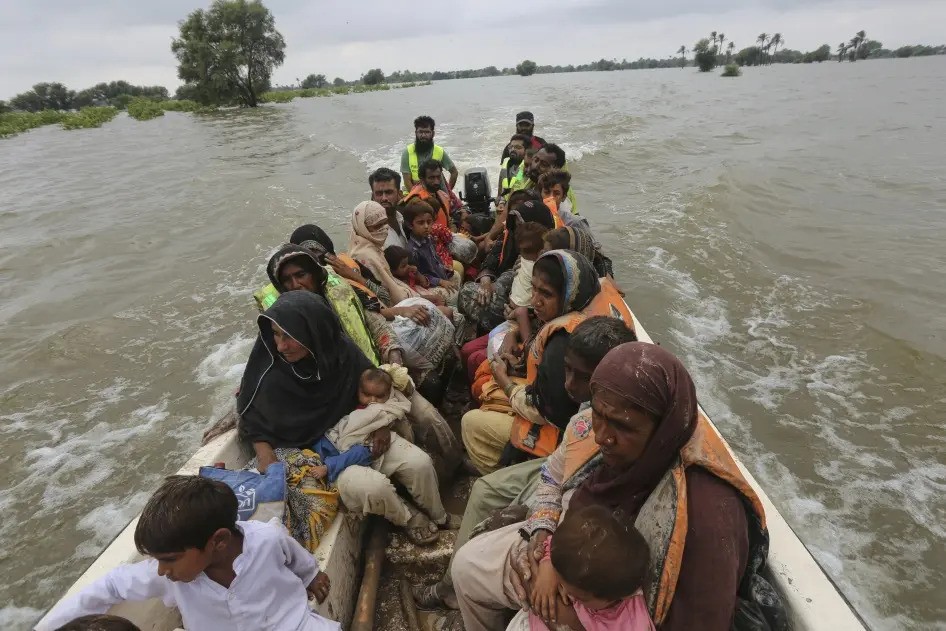This article was written by Ummul Huda, a 2nd-year B.S. Psychology student at Virtual University of Pakistan, studying Clinical Psychology. In this piece, she highlights the growing concern of climate anxiety and the importance of psychological support, awareness, and community care in addressing its impact on mental health.
In 2025, floods devastated large parts of Pakistan, displacing thousands and leaving communities struggling to recover. Watching the news, scrolling through stories of people losing homes, animals, and livelihoods, it becomes clear that climate change is not some distant problem. It is here, it is real, and it affects our minds as much as our surroundings. Environmental disasters do not just harm the body; they shake mental health, creating fear, anxiety, and helplessness.
This feeling, often called climate anxiety, is a mix of worry, sadness, and stress about the planet’s future. It is not just about being concerned; it can disrupt sleep, make concentration hard, and leave you feeling hopeless. And it is everywhere. Even people far from disaster zones feel it when they see images of floods, wildfires, or droughts. A 2021 study published in The Lancet Planetary Health surveyed 10,000 young people across 10 countries and found that 59% were very or extremely worried about climate change, with 45% reporting it negatively affected their daily life and functioning.
Why It Hits Hard
The anxiety is not always about immediate danger; it is the profound uncertainty of tomorrow. Climate anxiety shows us that environmental stress is deeply human. It touches emotions, relationships, and daily life. In Pakistan, research from Sindh’s desert regions found that over half of participants reported moderate-to-severe anxiety and depression related to climate change, while 86% experienced high stress levels. These numbers remind us that climate anxiety is not abstract. It is a reality for vulnerable communities.
Finding Ways to Cope
So how do we deal with something that feels so overwhelming? Simple strategies can help: mindfulness, breathing exercises, and grounding techniques to stay present. Taking action, even small things like planting trees, participating in clean-up drives, or raising awareness, can give a sense of control. Limiting constant exposure to alarming news also helps. It is okay to care, but it is not healthy to drown in despair.
Psychological support is key. During the 2025 floods in Pakistan, volunteers offered psychological first aid (PFA), sitting with people, listening without judgment, helping them process emotions, and connecting them with resources. Similar efforts were seen during wildfires in Australia, where children and adults received structured support to cope with trauma. These moments show that mental health care is not a luxury. It is essential, and early support can make a world of difference. If you are struggling with climate anxiety, know that your feelings are valid. Talking to a mental health professional can provide you with the tools to manage this stress. Sharing your concerns with supportive communities, both online and offline, can also remind you that you are not alone in this fight.
Learning and Awareness
Education and awareness go hand in hand with mental health support. Understanding what is happening, knowing that solutions exist, and connecting with supportive communities can turn anxiety into action. Even simple conversations such as listening, guiding, and showing empathy can help people feel more empowered and resilient.
A Call to Action
Climate anxiety is not a weakness. It is a reflection of care, empathy, and awareness. The data shows this is a shared global experience, but also a pressing local issue in Pakistan. Acknowledging our fears, seeking help when we need it, and taking meaningful action, whether small or large, can transform anxiety into hope. Taking care of our mental health is part of how we care for our planet, and every step you take, whether for yourself, your community, or the environment—matters.
References:
UNICEF (2021). The Climate Crisis Is a Child Rights Crisis: Introducing the Children’s Climate Risk Index. Retrieved from: https://www.unicef.org/reports/climate-crisis-child-rights-crisis
Khan, A. et al. (2022). Mental health impacts of climate change in desert regions of Pakistan. BMC Public Health. Retrieved from: https://bmcpublichealth.biomedcentral.com/articles/10.1186/s12889-022-13740-0





